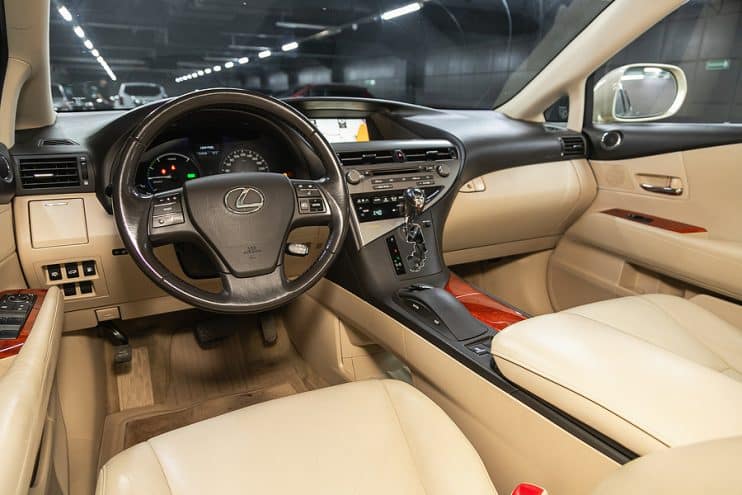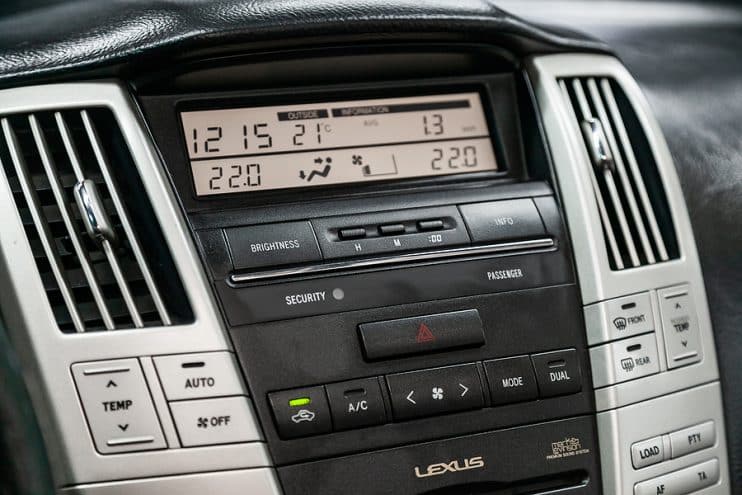
The RX from Lexus boasts a spacious and luxurious interior with high-quality craftsmanship and materials, comfortable seating, and a range of features, including a large touchscreen infotainment system and driver-assist safety features. Available as petrol and hybrid variants, owners of Lexus RXs say it delivers a smooth performance and comfortable driving.
As with most cars, the Lexus RX has its fair share of problems, as reported by drivers and owners. From oil leaks and issues with the steering to battery failure and air-con faults, we’ll guide you through the most common gripes you might encounter with the Lexus RX.
- What are the most common problems with the Lexus RX?
- Is the Lexus RX a reliable car?
- Which RX years are the best?
- Which Lexus RX models should you avoid?
- Are Lexus RX problems expensive to fix?
What are the most common problems with the Lexus RX?
From oil leaks to rattling doors, here are some of the most common problems reported by Lexus RX drivers and owners throughout the years.
Oil leaks
A significant issue plaguing early Lexus RX 350 models was oil leaks from the engine, causing maintenance challenges and expensive repairs and even leading to a replacement engine. Due to these leaks, many owners had to pay for engine sealants or repairs.
Dashboard cracks
The 2007 Lexus RX experienced a problem with the plastic used in the dashboard, resulting in cracking. While most cracks were just cosmetic, some posed a risk to the airbag system because of their location.
Later releases fixed the problem, but buying an early Lexus RX that could still crack may be possible, potentially affecting safety and increasing discomfort or concern for owners. And, of course, no one wants a luxury SUV with an unsightly crack in the dashboard.

Steering issues
Early Lexus RX 350 releases experienced steering issues, notably power steering fluid leaks from the rack and pinion system. Not only is this a massive safety hazard – it can also be costly to repair.
Unfortunately, the problem is hard to predict and can also affect vehicles with fewer than 100,000 miles on the clock.
Rattling doors
The 2010 Lexus RX 350 suffered from multiple body issues, but one of the most commonly reported problems was rattling front doors, posing security risks and compromising driving comfort and security.
Owners reported hearing rattling from their doors while driving; some even witnessed their car doors becoming loose, which is a significant safety concern.
Airbag problems
Several Lexus RX years have had issues with the supplemental restraint system (SRS) warning lights, signalling potential safety concerns. Drivers report error codes such as B0111 and B0116, indicating faulty sensors or depleted backup batteries.
Battery failure
Premature battery failures are a common issue in Lexus RX 350 models. These can increase maintenance costs, especially if the problem keeps cropping up.
Defective rain sensors
Despite its convenience, the rain-sensing windshield feature in Lexus RX 350 models, particularly in 2017, faces widespread complaints due to faulty sensors.
Many owners report problems with the sensor performance, particularly at night, leading to malfunctioning wipers despite adjustments for sensitivity. The problem can affect visibility while driving in poor conditions.
Shock absorbers/suspension
Many drivers have reported problems with suspension and shock absorption, particularly in the Lexus RX 4560h, which is a hefty vehicle.
Signs of shock absorber failure may include uneven dipping of the vehicle, and drivers may notice a less-than-comfortable ride when out on the road.
Transmission issues
The Lexus RX has been reported to experience various transmission problems, including issues with shifting, rough or delayed gear changes, and transmission fluid leaks. Some owners have also reported transmission failure, leading to expensive repairs or even a replacement gearbox.
There have also been complaints about the transmission slipping or jerking during acceleration or deceleration.

Electrical problems
The Lexus RX 350 has encountered several significant electrical system issues, from the failure of the door lock actuator to warning lights appearing on the dashboard. These failures pose considerable safety risks, as they may cause loss of vehicle control and increase the likelihood of accidents.
Owners have also reported intermittent problems with lighting, accessories, and engine starting issues.
AC / air conditioning issues
Many Lexus RX drivers report problems with the air conditioning, often appearing in models from 2007 to 2013 and affecting vehicles with over 26k mileage on the clock.
Lexus provides an updated part to fix the issue, but the cost can vary depending on the problem’s diagnosis.
Is the Lexus RX a reliable car?
RX owners are generally satisfied with their cars, according to a recent What Car? Reliability Survey, which found it finishing second out of 24 vehicles in the large SUV class, with an impressive 98.6 per cent reliability rating.
Which RX years are the best?
Among the earlier generations, the 2nd generation RX 350, spanning 2007 to 2009, stands out for its combination of luxury and reliability. The 2009 model is considered the best due to relatively fewer complaints and robust performance from this period.
Moving to the 3rd generation of RX 350 (2010 to 2015), 2011 to 2015 are the top picks with excellent ratings for comfort and technology.
The 4th generation, introduced in 2016, has also fared well with drivers. This generation features significant design, technology, safety improvements, and excellent reliability ratings. With modern technology like Apple CarPlay, Android Auto, and advanced safety systems, they offer a luxurious and premium SUV experience.
Which Lexus RX models should you avoid?
The worst year for the Lexus RX 350 is the 2010 model, which tends to get the most complaints. Common problems associated with this year are oil leak issues, particularly concerning the VVT-i oil line, which could burst and lead to rapid oil loss and potential engine failure. This model year was also affected by reports of unintended acceleration, resulting in a significant recall to address floor mat and pedal-related issues that could trap the accelerator.
The 2010 RX 350 also faced challenges with the cooling system, potential engine overheating, and various electrical issues, such as battery or alternator failures.
Are Lexus RX problems expensive to fix?
While routine maintenance is reasonable, fixing significant issues with Lexus RX models can be costly due to the luxury features and specialised parts. However, drivers can save by independently sourcing new and used Lexus RX parts online. Despite this, the reliability of the Lexus RX often offsets repair costs over time.


.png)